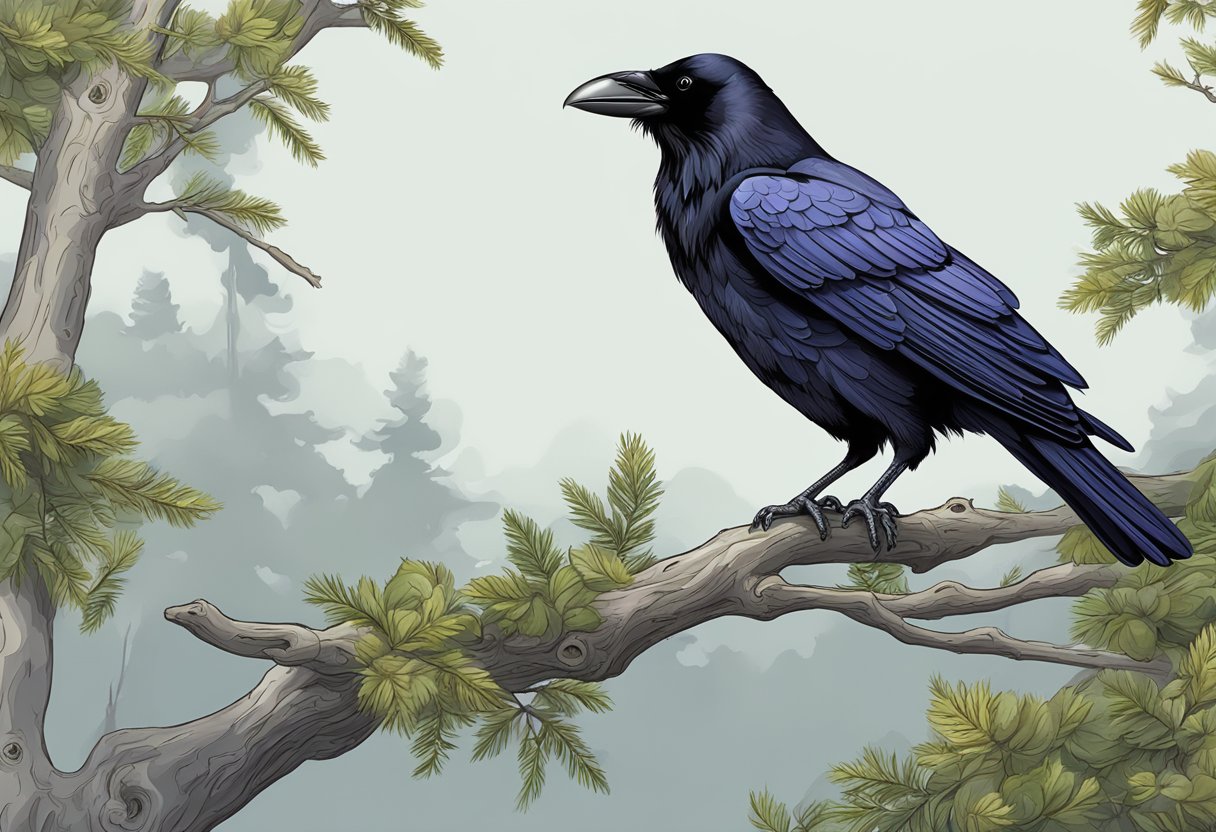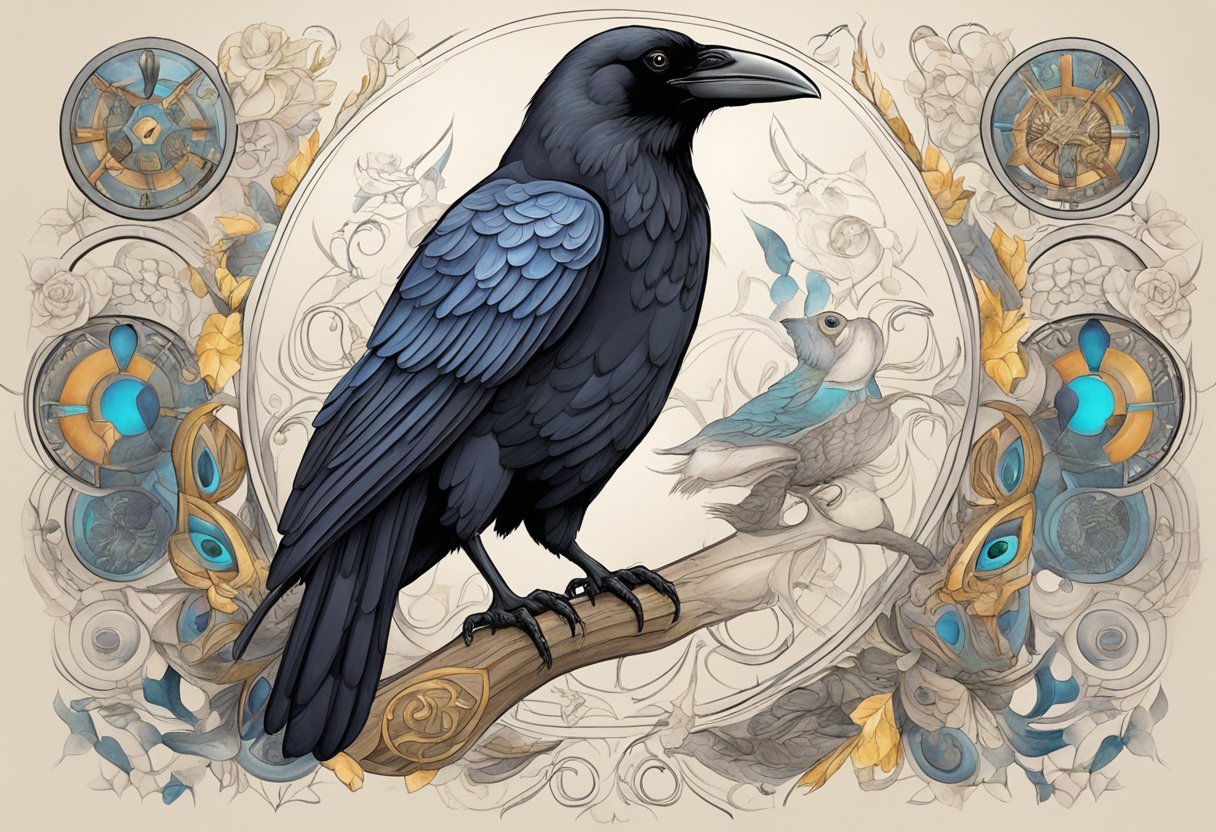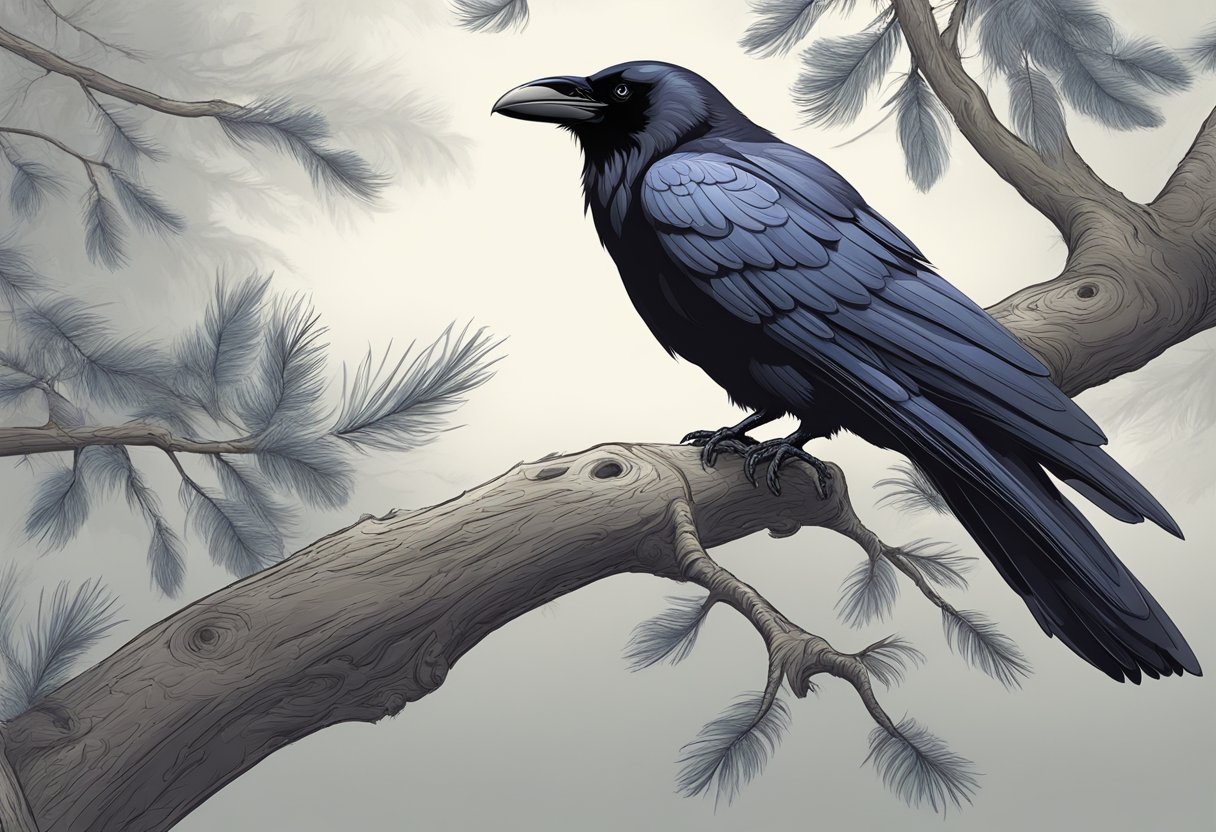The raven is a bird that has been mentioned several times in the Bible, and it has been used to symbolize different things throughout history.
In the Bible, the raven was first mentioned in the account of Noah, where it was sent out as a scout to see if the floodwaters had receded enough for Noah to leave the ark.
Since then, the raven has been used to symbolize different things in the Bible.

One of the most common symbolic meanings of the raven in the Bible is its association with death and darkness.
In many cultures, the raven has been seen as a bird of ill omen, and its black feathers and eerie call have been associated with death and the underworld.
In the Bible, the raven has been used to symbolize the darkness of sin and the judgment of God.
For example, in the book of Proverbs, the raven is used as an example of a bird that is unclean and abominable to God.
However, the raven has also been used to symbolize other things in the Bible.
For instance, in the story of Elijah, the raven was used to bring food to the prophet when he was hiding in the wilderness.
This is a reminder that even in the midst of darkness and judgment, God can still provide for his people.
Overall, the raven is a fascinating bird with a rich history of symbolism in the Bible, and its meaning can vary depending on the context in which it is used.
Raven in the Bible
The raven is a bird that has been mentioned several times in the Bible, and it has been used to symbolize different things.
This section will explore the various instances where the raven is mentioned in the Bible and what it represents.
Raven and Noah’s Ark
In Genesis 8:7, Noah sends out a raven from the ark to see if the floodwaters had receded. The raven flew back and forth until the waters had dried up.
This story shows the intelligence of the raven as it was able to navigate and survive during the flood.
Raven and Prophet Elijah
In 1 Kings 17:4-6, God sends ravens to feed the prophet Elijah during his time of need. The ravens brought bread and meat to Elijah, and he was able to survive in the wilderness by the brook Cherith.
This story shows the provision of God and the loyalty of the ravens to fulfill His command.
Raven in Job and Proverbs
In Job 38:41, the raven is mentioned as one of the birds that God provides for its young.
In Proverbs 30:17, the raven is mentioned as one of the three things that are too wonderful for the writer to understand.
These verses show the wisdom and knowledge of God and the insight that the raven has into the universe.
Raven in Leviticus and Deuteronomy
In Leviticus 11:15 and Deuteronomy 14:14, the raven is listed as an unclean bird that should not be eaten.
This shows the importance of following God’s laws and the abominations that are considered unclean.
Raven in Song of Solomon and Psalms
In Song of Solomon 5:11, the beauty of the raven is mentioned as the writer describes the hair of his beloved.
In Psalm 147:9, the provision of God is mentioned as He provides food for the raven. These verses show the spiritual meaning of the raven as a bird that is both beautiful and provided for by God.
Raven in Luke and Isaiah
In Luke 12:24, Jesus mentions the raven as a bird that does not sow or reap, yet God provides for it.
This shows the importance of having faith in God and trusting Him to provide for our needs.
In Isaiah 34:11, the raven is mentioned as a wild bird that nests and lays eggs in desolate places.
This shows the cunning and survival skills of the raven in finding a way to survive in harsh environments.
Raven in Genesis
In Genesis 8:6-7, Noah sends out a raven from the ark to see if the floodwaters had receded.
The raven flew back and forth until the waters had dried up. This story shows the intelligence of the raven as it was able to navigate and survive during the flood.
Overall, the raven in the Bible represents different things such as intelligence, trust, symbolism, faith, spiritual meaning, loyalty, cunning, wisdom, knowledge, survival, and insight.
The raven is a carrion feeder and is part of the genus Corvus corax, which has a universal distribution.
The raven has been mentioned by Aristotle and Pliny, and it is a wild bird that nests and lays eggs in desolate places.
Read too: Biblical Meaning of Seeing a Blue Jay: Spiritual Insights Revealed
Raven Symbolism in Different Cultures

Ravens have been a part of different cultures and mythologies throughout history. They have been associated with both positive and negative symbolic meanings, depending on the culture and the context.
In this section, we will explore the symbolic significance of ravens in different cultures, including Native American culture, Norse mythology, Greek mythology, and Jewish tradition.
Raven in Native American Culture
In Native American culture, the raven is considered a powerful spirit animal that represents transformation, insight, and the universe.
It is believed that encountering a raven can bring both good luck and bad luck, depending on the situation.
The raven is also associated with witchcraft and occult practices in some Native American tribes.
Raven in Norse Mythology
In Norse mythology, the raven is associated with the god Odin, who is often depicted with two ravens on his shoulders.
The ravens, named Huginn and Muninn, represent Odin’s ability to gain insight and knowledge from the universe.
The raven is also believed to have the power of transformation, as it can change its appearance and shape.
Raven in Greek Mythology
In Greek mythology, the raven is associated with Apollo, the god of prophecy. The raven is said to be a symbol of bad luck and was often used as a messenger of the gods in the mortal world.
According to the mythological narration, Apollo sent a white raven or crow in some versions to spy on his lover, Coronis.
Raven in Jewish Tradition
In Jewish tradition, the raven is mentioned in the Talmud as a bird that Noah sent out from the ark to search for land.
The raven did not return to Noah, indicating that it had found a place to rest. The raven is also believed to have been a friend to the prophet Elijah, who was fed by ravens during a time of famine.
Overall, the raven has been a significant symbol in various cultures throughout history.
Its symbolic meaning varies depending on the context, but it is often associated with transformation, insight, and the universe.
Whether it is viewed as a spirit animal, a messenger of the gods, or a friend to the prophets, the raven continues to fascinate and intrigue people with its mysterious and powerful presence.
Read too: Biblical Meaning of Hummingbird: 11 Warnings from the Bible
Final Words

In conclusion, the raven has been a significant symbol in the Bible, representing both positive and negative aspects.
It is often associated with spiritual meaning, such as the ability to communicate with the divine and the power of prophecy.
The raven is first mentioned in the Bible during the story of Noah’s Ark, where it was sent out to search for land after the flood. It did not return, but instead found food and rested on the water.
This event has been interpreted in various ways, with some seeing it as a sign of disobedience and others as a symbol of hope and new beginnings.
Throughout the Bible, the raven is also associated with death and destruction. For example, it is mentioned in the book of Job as a bird that feeds on the dead, and in Proverbs as a creature that brings curses.
However, it is important to note that these negative connotations are not always present and that the raven can also represent positive qualities such as intelligence and resourcefulness.
Overall, the raven’s symbolism in the Bible is complex and multifaceted, and its meaning can vary depending on the context.
Nevertheless, it remains a powerful symbol that continues to capture the imagination of many.